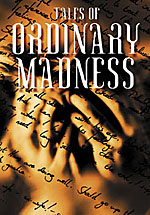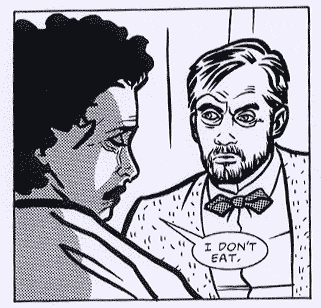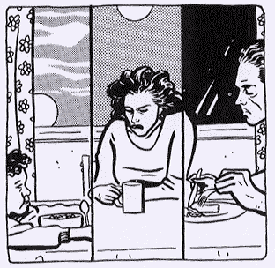 Written by Malcolm Bourne
Written by Malcolm Bourne
Art by Mike Allred
112 pages, black and white
Published by Oni Press
If you were reading comics in 1992, chances are you already knew the name Malcolm Bourne. His big writing debut was that January, but he’d already made a reputation for himself in what were the comic discussion forums of that era: letter columns. Witty, erudite, and carefully spoken, your letter column just wasn’t complete until Bourne graced its presence once. Then in January 1992, Bourne and a little-known artist named Mike Allred debuted a mini-series at Dark Horse, Tales of Ordinary Madness. It’s a little over a decade later, and the book has a new lease on life as a trade paperback. Now that time has distanced its potential readers from Bourne’s reputation as a letter column scribe, the question remains: Is it any good?
A psychiatric Doctor at a hospital sees all sorts of patients come in and out of his office: paranoid, suicidal, delusional, and worse. As he tries to get himself into their heads to see just what makes them tick, though, will he find himself associating too much with them? And when a diagnosis goes terribly wrong, what repercussions will follow?
 Bourne’s nameless Doctor is a peculiar character; early on in Tales of Ordinary Madness his role seems to be almost akin to the hosts of old EC Comics, introducing the characters and their situations. On that level alone, I really enjoyed Tales of Ordinary Madness; Bourne does a good job at getting into their heads, bringing their diseases to life so they’re more than just familiar names or diagnoses. It’d be easy to degenerate into cliché here, but Bourne doesn’t do so. At the same time, though, Bourne does try to make the Doctor a character in his own right as well. It’s not until the story progresses that you start to get some glimpses into his own life, trying to figure out what makes him tick. The problem is that his story seems to happen at an accelerated rate in the second half of the collection, when it would’ve worked better spaced out a litlte more through the entire book. It’s a little frustrating because it’s such a dramatic conclusion, but it’s almost like you’re seeing the payoff to a narrative that wasn’t there.
Bourne’s nameless Doctor is a peculiar character; early on in Tales of Ordinary Madness his role seems to be almost akin to the hosts of old EC Comics, introducing the characters and their situations. On that level alone, I really enjoyed Tales of Ordinary Madness; Bourne does a good job at getting into their heads, bringing their diseases to life so they’re more than just familiar names or diagnoses. It’d be easy to degenerate into cliché here, but Bourne doesn’t do so. At the same time, though, Bourne does try to make the Doctor a character in his own right as well. It’s not until the story progresses that you start to get some glimpses into his own life, trying to figure out what makes him tick. The problem is that his story seems to happen at an accelerated rate in the second half of the collection, when it would’ve worked better spaced out a litlte more through the entire book. It’s a little frustrating because it’s such a dramatic conclusion, but it’s almost like you’re seeing the payoff to a narrative that wasn’t there.
 It’s interesting to jump back to Allred’s earlier work and see that even then he had such a strong command of the page. His grasp of anatomy is strong, a necessity for a reality-based comic. There’s a wonderfully large number of panels on almost every page, but they never feel cramped or cluttered; it’s just a good sense of storytelling, able to really tell Bourne’s story to the fullest. And whenever we do get a glimpse into the patients’s minds, it’s great to see how Allred interprets them, from a cloud of eyes surrounding someone to a complicated board game/maze that people have to maneuver through.
It’s interesting to jump back to Allred’s earlier work and see that even then he had such a strong command of the page. His grasp of anatomy is strong, a necessity for a reality-based comic. There’s a wonderfully large number of panels on almost every page, but they never feel cramped or cluttered; it’s just a good sense of storytelling, able to really tell Bourne’s story to the fullest. And whenever we do get a glimpse into the patients’s minds, it’s great to see how Allred interprets them, from a cloud of eyes surrounding someone to a complicated board game/maze that people have to maneuver through.
Rushed ending aside, I definitely do recommend Tales of Ordinary Madness. Bourne makes his patients fascinating reading, and his background as a psychiatrist lends a real feeling of authenticity to the stories. Add in some previously uncollected Allred art, and it’s pretty easy to see why Oni Press decided to rescue the book from obscurity. It may be twelve years later, but hopefully this reissuing will bring Bourne back into comics writing for another go-round.
Purchase Links:
